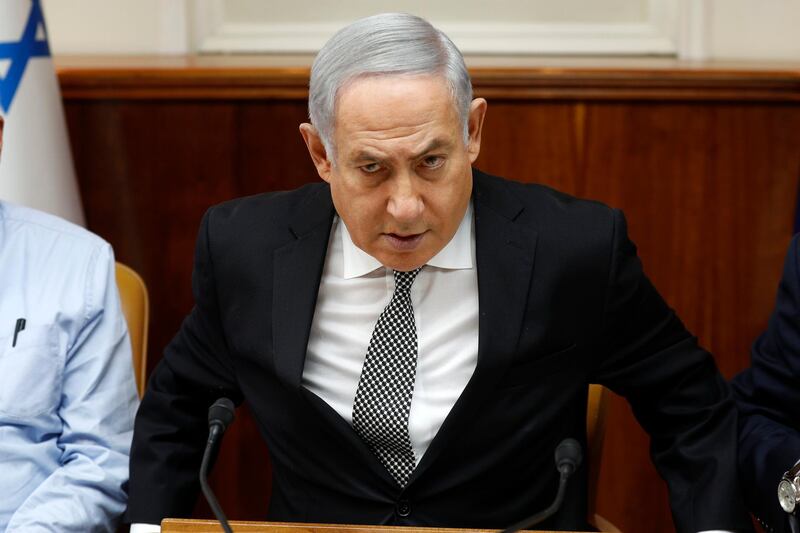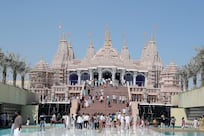Israeli democracy has for years been called into question by critics because of the country's occupation of the West Bank.
But corruption scandals swirling around Prime Minister Benjamin Netanyahu are further eroding it, polarising the country and tainting its politics and media.
"The amount of rot in the Israeli political system is much greater than we thought," said Gadi Wolfsfeld, a specialist in political communication at the Interdisciplinary Centre Herzliya, near Tel Aviv.
On February 13, the police recommended indicting Mr Netanyahu for bribery and breach of trust in two cases. A final decision now rests with attorney general Avichai Mandelblit.
In one case, known as Case 1000, the prime minister allegedly accepted illicit gifts from two business moguls totalling more than US$250,000 (Dh918,225).
In a second case, known as 2000, Mr Netanyahu allegedly negotiated with Arnon Mozes, the publisher of a leading newspaper, Yedioth Ahronoth, for favourable coverage of himself in exchange for support for legislation that would have weakened a competitor publication, Israel Hayom.
Mr Netanyahu has rebuffed calls from the opposition to resign, saying he would continue to lead for many years, while his allies made statements impugning the integrity of the police and saying the recommendations are part of a coup against the democratically elected government. His coalition partners backed him up.
___________________
Police suspect Netanyahu associate of trying to bribe judge
Prime Minister Netanyahu and his long list of scandals
___________________
"It's worrisome," Mr Wolfsfeld said. "The coalition holding together despite the police recommending bribery charges against the prime minister wouldn't happen in most western countries. The prime minister would be forced to resign, but now Netanyahu's supporters are suggesting that even if indicted by his own attorney general he will still stay in power. This is a precedent that harms Israeli political culture. It means that leaders who are under suspicion can continue to serve unless they are indicted and maybe even unless they go to prison."
Mr Netanyahu is serving his fourth term as prime minister, with his main political legacy being the expansion of Israeli settlements in the West Bank in contravention of international law and advancing Israeli annexation of that territory.
He has indulged in attacks on the police chief, Inspector General Roni Alsheich. After the latter hinted in a television interview broadcast in early February that Mr Netanyahu had sent private investigators to collect information against police officers involved in his case, the premier accused the top officer of saying "delusional" things and suggested any recommendations made on Mr Alsheich's watch would be biased.
Uri Dromi, former spokesman for Yitzhak Rabin, Israel's assassinated prime minister, said such an approach harms the state.
"Netanyahu pulls down everything to survive. Once you attack the chief of police and question the motive of police investigators, everyone in touch with the police loses confidence. The damage spreads far beyond the Netanyahu cases and undermines public trust in the institutions most important for democracy."
For the first time, major media outlets are an integral part of the corruption scandals. In addition to the Yedioth case, police suspect Mr Netanyahu made a deal to skew coverage of the Walla news website in his favour in exchange for granting regulatory benefits to telecommunications giant Bezeq, whose primary owner, Netanyahu family friend Shaul Elovitch, also owns Walla.
"The media today is serving power more than civil society," said Roman Bronfman, a left-wing former member of the Knesset. "The role of the media should be to watch those in power, not support them." He added, however, that there are also brave Israeli journalists exposing scandals and holding Mr Netanyahu to account.
Anat Balint, an academic and a media analyst for the publication The Seventh Eye, wrote that the Walla Case, known as Case 4000, "is another reminder that not only the politicians and magnates are the central players in these corruption cases". Senior echelons of the media are also involved. "This means the Israeli public gets a mistaken and twisted picture of reality in which there is no possibility of unravelling the distortions and the interests behind them," she added.
But not all observers believe the scandals are damaging Israeli democracy.
"The way all these issues are investigated shows that no one in Israel is above the law," said Yedidia Stern, a scholar at the Israel Democracy Institute.
"Netanyahu, the most important leader in the last generation, is being investigated like anyone else and may be kicked out. The rule of law is quite safe in Israel."
Avraham Diskin, a political scientist at the Hebrew University of Jerusalem, added: "I don't think the elected bodies, the Knesset, have been influenced significantly or that trust in the democratic process has been harmed."
He backed Mr Netanyahu's decision not to step down, saying the law clearly requires this only after a final conviction. The key question, Mr Diskin said, is whether Mr Netanyahu's ability to function as prime minister is harmed because of the police recommendations.
"Israel cannot afford a leader who doesn't function. But for the time being he continues to function quite normally," he said.
Anat Berko, a member of parliament from Mr Netanyahu's Likud party, told The National: "You can't convict a person in advance. He is an excellent prime minister, but people with a political agenda are trying to harm him. We will continue to support him every step of the way."
But Yousef Jabareen, an Arab member of parliament, said the ongoing cases "are further proof that Israeli democracy has been corrupted for a long time".
"You can't be democratic in Israel on the one hand and preserve a system of occupation and apartheid at the same time."





